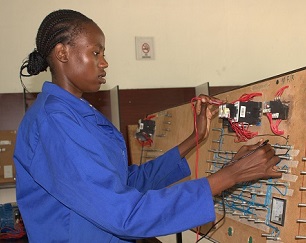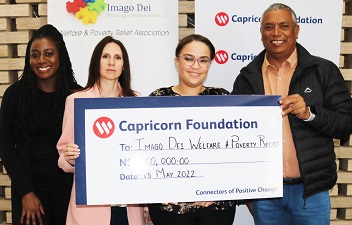
Omba Arts Trust assists marginalised communities to market traditional handicrafts

By Natasha Jacha
Local non-profit organisation, Omba Arts Trust, has committed itself in the universal call to action to end poverty and ensure that all people enjoy peace and prospertity, as set out by one of the United Nations Sustainable Development Goals (SDGs).
The organisation based in Windhoek assists marginalised communities with a platform to generate revenue from their traditional handicrafts and currently is the largest body marketing local traditional and contemporary crafts.
According to the director of the Omba Arts Trust’s, Karin le Roux, the company supports 400 producers in over 15 communities in eight regions countrywide, and 95% of the total number of producers are women and 60% are the San from the Omaheke, Ohangwena and Otjizunjupa regions.
“Omba Arts Trust supports local artisans through training, product development and sourcing materials and then channels their handicrafts to markets that would otherwise not be exposed to unique quality local products. By adding commercial value to their craft, not only are traditional skills being maintained but the lives of marginalised communities are also improved. This income contributes to poverty alleviation,” added Le Roux.
Although their crafts are rooted in local culture, a modern twist is added to the final product appealing to a different market. For example, several new ranges of ostrich eggshell bead jewellery made by Ju’/hoansi women have been introduced to the market, but the same centuries-old bead-making technique used in the making of this range remains the same.
However, the craft sector faces many challenges like the lack of raw materials and costs to reach remote communities, but Bank Windhoek since 2007 has continuously supported Omba Arts Trust, in the form of liquidity to acquire more raw materials and stock.
Le Roux said that the Bank Windhoek grants have helped the company to grow their income as well as the turnover of the organisation and most importantly, they have contributed to the sustainability of the organisation.
Despite the challenges, the organisation’s 2017/2018 annual review indicated positive results, with the tourism industry’s encouraging performance yielded incomes for most of the core groups.
The organisation in its achievements have designed an ostrich eggshell necklace which featured at the Commonwealth Fashion Exchange in the United Kingdom.
Furthermore the Trust has managed to establish a new craft group in Oshana Region and the impact of Omba Arts Trust’s Lighting up of Women’s Lives in the Kavango Region.
“We have also been addressing food security in some of the San communities we work with and with the support from the Finnish Embassy, we have developed several new products that we hope to launch at an exhibition in July 2018 and will attend some markets abroad,” added Le Roux.
Meanwhile, the Omba Arts Trust will continue ensuring the sustainability of their projects and the livelihoods of the communities that they support in the future. Maintaining good relationships with artisans and keeping a close eye on the relevance and evolution of the products, remains key to the success of the communities who make crafts for a living.
“The Omba Arts Trust is one such partner and we have seen the impact of their operations and philosophies in the communities that benefit from their association with the organisation,” said Bank Windhoek’s Executive Officer of Marketing and Corporate Communication Services, Jacquiline Pack.
The Trust meanhile will continue to oversee production and plans for sustainability, and will focus on the contemporary San art with exhibitions planned for 2018/19.
Caption: Grand: Omba Arts Trust salesperson, Vanessa Kasupi models necklaces made from ostrich eggshell beads and new bracelet designs. The ostrich eggshell necklaces was exhibited at the Commonwealth Fashion Exchange in the United Kingdom. It was also displayed during a reception at Buckingham Palace, an event attended by members of the British Royal Family.













































